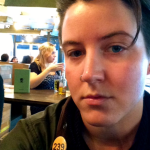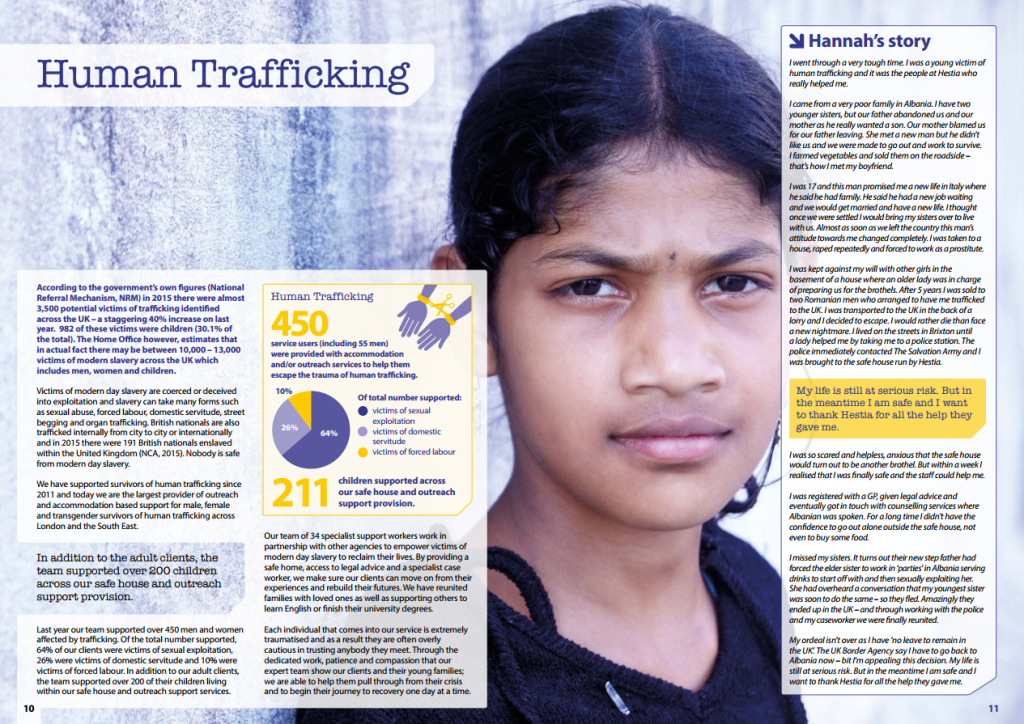By Anna Sereni, Anti-Human Trafficking Team Leader at Hestia.
A place to pine and suffer, Human Trafficking: The case of Albania
‘Countries with more gender equality have better economic growth. Companies with more women leaders perform better. Peace agreements that include women are more durable. Parliaments with more women enact more legislation on key social issues such as health, education, anti-discrimination and child support. The evidence is clear: equality for women means progress for all.’ – UN Secretary-General Ban Ki Moon
When I was asked to write a blog for the 16 Days of Activism my first thought was: this is a numbers game. The 16 Days of Activism Against Gender Violence is an international campaign originating from the first Women’s Global Leadership Institute in 1991.
For me, the symbolic link between violence against women and human rights is nowhere more prevalent than in the global phenomenon of human trafficking; although the correlation doesn’t end there. I felt that writing a blog was a journey; that’s how I viewed The 16 Days Campaign. It is a journey that’s built around a network of significant places and the same can be said for victims of trafficking.
When you run the numbers, VAWG (Violence Against Women and Girls) and Human Trafficking really add up.
Human Trafficking in Persons is ‘the recruitment, transportation, transfer, harbouring or receipt of persons, by means of the threat or use of force or other forms of coercion, of abduction, of fraud, of deception, of the abuse of power or of a position of vulnerability; [a] person having control over another person, for the purpose of exploitation.’[1] It is a series of connected actions with the final purpose being a form of exploitation (such as labour or sexual exploitation).
Human Trafficking is a serious crime and a grave violation of human rights. For those who befall it, exploitation can last anywhere from 16 days to 16 years and beyond.
Globally, trafficking in human beings is a gendered phenomenon with women thought to be victims in more than 80% of trafficking cases.[2] Sexual exploitation is the most prevalent form of trafficking with women constituting 85% of victims.[3]
The Case of Albania
The Balkans, an oft over looked, oft misunderstood region of the world is home to Albania, a country of 3.2 million people. It remains one of the least known countries in Europe yet the number of women seeking asylum and refuge in the EU is increasing year on year. In 2015, Germany alone saw 54,762 applications for asylum (which rejected 99% of their claims).[1]
The Albanian constitution states: ‘All are equal before the law.’[2] In spite of this, statistically it’s women who are being trafficked from its borders. There are a number of social and economic factors for this, but for numbers sake, I’ll focus on two.
According to the Home Office, in Albania, some 53 percent of women will have experienced domestic violence within the last 12 months.
Many of the women and girls who are trafficked from Albania report fleeing forced marriages, and domestic violence. Domestic violence in Albania is a serious and widespread problem. According to the Home Office, in Albania, some 53 percent of women will have experienced domestic violence within the last 12 months.[3] Violence against women is not only perpetrated by current or former husbands/partners but also parents, brothers, sisters, in-laws, and other relatives.
Albanian society is male dominated and in it women are taught to obey their husbands and accept their submissive roles. Many are married for dowries. Most women are expected to serve their families, bear children and preserve Albanian cultural traditions all from the age of 14. In Albania the age of consent is 14 years old for girls; however, if a girl has not reached sexual maturation by age 14, sexual intercourse is still illegal.[4] Age then, is but a number.
In all societies, cultural attitudes toward male honour serve to justify violence against women. What’s more, you don’t need to be a mathematician to understand that such a justification exacerbates its consequences. A culture that embraces male masterdom over women encourages violence and it also encourages something else: trafficking for the purposes of sexual exploitation.
This year, 22% of Hestia’s Human Trafficking Service referrals have been Albanian women and children. According to Unicef, the duplicity of domestic violence and human trafficking in Albanian women has meant that in some rural areas of the country 90% of adolescent girls leave secondary school for fear of being kidnapped.[5] Additionally, in their own guidance, a Home Office report found that in Albania close relationships are often used to exploit and control others. There have been numerous incidents where ‘boyfriends’ have groomed women into sexual exploitation.[6]
Sadly, that’s exactly what happened to Hannah:
I went through a very tough time. I was a young victim of human trafficking. I came from a very poor family in Albania. I have two younger sisters, but our father abandoned us and our mother as he really wanted a son. Our mother blamed us for our father leaving. She met a new man but he didn’t like us and we were made to go out and work to survive. I farmed vegetables and sold them on the roadside – that’s how I met my boyfriend. I was 17 and this man promised me a new life in Italy where he said he had family. He said he had a new job waiting and we would get married and have a new life. I thought once we were settled I would bring my sisters over to live with us. Almost as soon as we left the country this man’s attitude towards me changed completely. I was taken to a house, raped repeatedly and forced to work as a prostitute. I was kept against my will with other girls in the basement of a house where an older lady was in charge of preparing us for the brothels. After 5 years I was sold to two Romanian men who arranged to have me trafficked to the UK. I was transported to the UK in the back of a lorry and I decided to escape. I would rather die than face a new nightmare. I lived on the streets in Brixton until a lady helped me by taking me to a police station.[7]
In patriarchal countries like Albania all men have power. For women like Hannah patriarchy, abuse and sexual exploitation are commonplace. She couldn’t turn and face up to violence and exploitation in Albania but we can.
Human Trafficking: The Journey
Where Hannah started her journey is just as important as where it ended in Brixton. Human trafficking then affects us all which is why only together we can find a solution.
On a mirror in my bedroom there’s a quote from a novel about the shortcomings of government and society by Charles Dickens. Like me, Dickens is talking about a journey:
‘One always begins to forgive a place as soon as it’s left behind’.[1]
Here, Dickens suggests that hope and new beginnings are only realised by leaving a place behind. Like this blog, his statement is twofold. While the notion of leaving all forms of exploitation and violence against women behind is a welcomed one, it also suggests that the places where these issues are perpetuated are so broken that they cannot be fixed, challenged or changed. For embattled women in these societies, you can’t turn and face sexual exploitation and you can’t turn and run from it. The dialectic is closed.
Together, we can galvanize towards new ways of educating all societies on gender equality, and the effects of violence and exploitation. If we keep the dialectic open we can change the lives of women like Hannah and all women and girls around the world.
There’s strength in numbers.
As a woman I am fighting sexism and patriarchy.
As a manager in Hestia’s Human Trafficking Project I’m fighting violence and sexual exploitation for all women in our services.
As a campaign, 16 Days of Activism is calling for the prevention and elimination of violence against women and girls.
As a world we need to understand that patriarchy and violence perpetuates all forms of exploitation and we cannot absolve ourselves of this by leaving any person or place behind.
 About the author:
About the author:
Anna Sereni is Anti-Human Trafficking Team Leader at Hestia.
In 2015, Anna travelled to Albania and worked with UNWomen on their Anti-Trafficking Services in Tirana.
References
[1] unodc.org/unodc/en/human-trafficking/what-is-human-trafficking.html
[2] ewl_briefing_thb_october_2011-2.pdf
[3] ewl_briefing_thb_october_2011-2.pdf
[4] amnesty.org/en/countries/europe-and-central-asia/albania/report-albania/
[5] gov.uk/government/uploads/system/uploads/attachment_data/file/514385/CIG_Albania_Women_fearing_domestic_violence_v_1_0.pdf
[6] gov.uk/government/uploads/system/uploads/attachment_data/file/514385/CIG_Albania_Women_fearing_domestic_violence_v_1_0.pdf
[7] ageofconsent.net/world/albania
[8] unicef.org/albania/domviol_eng.pdf
[9] gov.uk/government/uploads/system/uploads/attachment_data/file/521763/Victims_of_modern_slavery_-_Competent_Authority_guidance_v3_0.pdf
[10] hestia.org/wp-content/uploads/2016/11/Hestia_AR_2016.pdf
[11] http://www.goodreads.com/quotes/997849-one-always-begins-to-forgive-a-place-as-soon-as



